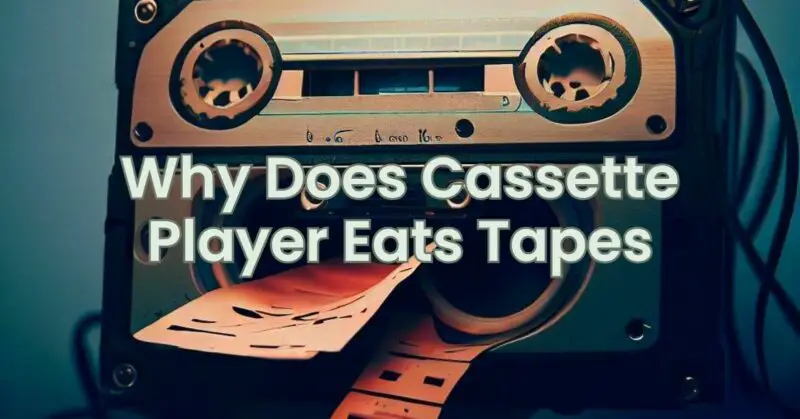Cassette players were once a popular medium for portable music playback, offering a convenient and portable way to enjoy music. However, many cassette players have earned a notorious reputation for “eating” tapes, where the tape gets tangled or damaged during playback. In this article, we’ll explore the reasons why cassette players may encounter this issue and discuss possible solutions to prevent it.
- Cassette tape residue: Over time, cassette tapes can become sticky. The oxide on the tape naturally and gradually sheds, and added moisture from the air will cause your tape to get this sticky residue. This residue can cause the tape to get stuck in the player, and the player may continue to try to pull the tape through, which can damage the tape and the player.
- Cassette tape damage: If a cassette tape is damaged, it can also get stuck in a cassette player. Common causes of cassette tape damage include:
- Dropping the tape
- Bending the tape
- Exposing the tape to heat or moisture
- Playing the tape on a dirty or damaged cassette player
- Cassette player problems: If a cassette player is not working properly, it can also eat tapes. Common problems with cassette players include:
- Worn belts
- Dirty or damaged heads
- Misaligned heads
- Broken gears
If your cassette player is eating tapes, there are a few things you can do to try to fix the problem.
- Clean the tape: If the tape is sticky, try cleaning it with a soft cloth. You can also try using a cassette tape cleaning fluid.
- Inspect the tape for damage: If the tape is damaged, try to repair it or replace it.
- Clean the cassette player: If the cassette player is dirty, try cleaning it with a soft cloth. You can also try using a cassette player cleaning fluid.
- Take the cassette player to a repair shop: If you have tried all of the above and the problem persists, you may need to take the cassette player to a repair shop.
Here are some tips to prevent your cassette player from eating tapes:
- Handle your cassette tapes with care. Don’t drop them or bend them.
- Store your cassette tapes in a cool, dry place. Avoid storing them in direct sunlight or near heat sources.
- Clean your cassette tapes regularly. Use a soft cloth to wipe away any dust or dirt.
- Inspect your cassette tapes for damage. If you find any damage, try to repair it or replace the tape.
- Have your cassette player serviced regularly. This will help to prevent problems with the player that could lead to tapes getting eaten.
In conclusion, cassette players may encounter issues where tapes get eaten or tangled during playback. Worn-out components, improper tape alignment, loose or damaged tapes, and low-quality or damaged tapes are some common factors that contribute to this problem. Regular maintenance, proper tape alignment, careful handling of tapes, and using high-quality media can help prevent tape-eating issues and ensure a smooth playback experience with your cassette player.


